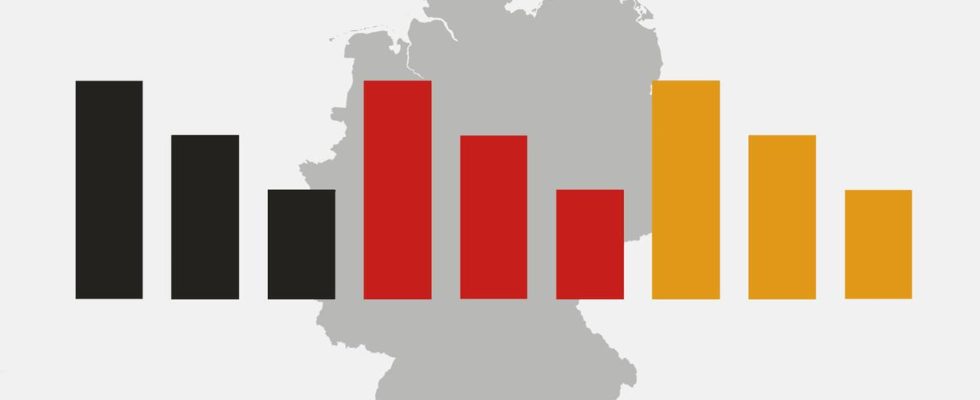Immigration is currently the most important political issue for most Germans. This comes from that GermanyTrend for the ARD morning magazine out. The traffic light parties continue to lose support.
The topic of immigration is currently affecting Germans more than any other. 44 percent of those surveyed mention it GermanyTrend for the ARD morning magazinen as, in their view, the most important political problem that politicians should address as a matter of priority. The area of armed conflict/peace/foreign policy follows in second place with 18 percent.
Other topics such as pensions/old-age security (13 percent), the economy (11 percent) and inflation and taxes (10 percent each) follow at a distance. Other priorities such as environmental protection/climate change (1 percent) or wages and social injustice (3 percent each), which were described as important by those surveyed in the past, clearly took a back seat this week.
Little support for traffic lights
After the recent state elections in Bavaria and Hesse, the traffic light parties remain under pressure in the current federal political climate. In the GermanyTrend for the ARD morning magazine The parties that make up the federal government together only have the approval of a third of the voters.
If there were a federal election next Sunday, the CDU/CSU would gain one percentage point compared to the previous week and would remain clearly the strongest faction with 29 percent. The AfD could also improve by one percentage point and record 23 percent, which is a new high for the party GermanyTrend is.
Free voters at four percent
The SPD would lose one percentage point and reach 15 percent, the worst poll result in this legislative period. Alliance 90/The Greens would also lose one percentage point and therefore reach 13 percent. The FDP as the third traffic light party would fall back to five percent (-1 percentage point). Free voters (+1 percentage point) and the left would both get four percent and would miss out on entering the Bundestag.
Investigation facility
Population: Eligible voters in Germany
Collection method: Random-based telephone and online survey
Survey period: October 10th to 11th, 2023
Number of cases: 1,203 respondents (706 telephone interviews and 497 online interviews)
Weighting: Voting behavior according to sociodemographic characteristics and recall
Sunday question with separate weighting
Shfluctuation range:
2 percentage points for a share value of 10 percent
3 percentage points for a share value of 50 percent
Implementing institute: Infratest dimap
Results are rounded to whole percentages to avoid false expectations of precision. For all representative surveys, fluctuation ranges must be taken into account. In the case of a survey with 1,000 respondents, these amount to around three percentage points for large parties and around one point for smaller parties. In addition, the rounding error is significant for small parties. For these reasons, no party is shown below three percent in the Sunday question.

